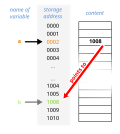In computer science, conditionals (that is, conditional statements, conditional expressions and conditional constructs) are programming language constructs...
38 KB (4,024 words) - 14:07, 24 May 2025
Conditional (computer programming), a statement or expression in computer programming languages A conditional expression in computer programming languages such...
1 KB (213 words) - 03:53, 27 August 2024
In computer programming, the ternary conditional operator is a ternary operator that is part of the syntax for basic conditional expressions in several...
55 KB (6,418 words) - 15:01, 12 May 2025
be used when referring to programs in high-level programming languages. In these branches usually take the form of conditional statements of various forms...
13 KB (1,701 words) - 00:33, 15 December 2024
Counterfactual conditional Biscuit conditional Conditional (computer programming), a conditional statement in a computer programming language Condition...
660 bytes (91 words) - 23:49, 25 February 2021
In computer programming, conditional loops or repetitive control structures are a way for computer programs to repeat one or more various steps depending...
4 KB (485 words) - 20:30, 7 November 2023
Relational operator (redirect from Comparison (computer programming))
In computer science, a relational operator is a programming language construct or operator that tests or defines some kind of relation between two entities...
28 KB (2,852 words) - 20:59, 28 May 2025
programming languages, with C compilers available for practically all modern computer architectures and operating systems. The book The C Programming...
101 KB (11,258 words) - 07:24, 14 June 2025
Computer programming or coding is the composition of sequences of instructions, called programs, that computers can follow to perform tasks. It involves...
42 KB (4,827 words) - 14:58, 14 June 2025
In computer programming, an operator is a programming language construct that provides functionality that may not be possible to define as a user-defined...
19 KB (1,179 words) - 20:49, 6 May 2025
In computer programming, a function (also procedure, method, subroutine, routine, or subprogram) is a callable unit of software logic that has a well-defined...
54 KB (6,531 words) - 04:31, 31 May 2025
In computer programming, a macro (short for "macro instruction"; from Greek μακρο- 'long, large') is a rule or pattern that specifies how a certain input...
33 KB (4,016 words) - 15:43, 13 January 2025
Turing completeness (redirect from Turing-complete programming language)
data-manipulation rules (such as a model of computation, a computer's instruction set, a programming language, or a cellular automaton) is said to be Turing-complete...
32 KB (3,448 words) - 22:13, 10 March 2025
Assembly language (redirect from Assembler (computer programming))
many programmers. There are still certain computer programming domains in which the use of assembly programming is more common: Writing code for systems...
89 KB (9,905 words) - 08:03, 13 June 2025
A programming paradigm is a relatively high-level way to conceptualize and structure the implementation of a computer program. A programming language can...
24 KB (2,666 words) - 18:21, 6 June 2025
Analytical engine (category Computer-related introductions in 1837)
flow in the form of conditional branching and loops, and integrated memory, making it the first design for a general-purpose computer that could be described...
43 KB (3,896 words) - 07:25, 17 April 2025
Turing-complete machines use an arithmetic operation and a conditional jump. Like the two previous universal computers, this class is also Turing-complete. The instruction...
31 KB (3,772 words) - 07:22, 25 May 2025
(foo) bar = frink; else baz = frink; Computer programming portal ?:, a conditional operator in computer programming Ternary operation Bitwise operators...
10 KB (1,094 words) - 13:38, 17 June 2025
In computer programming, conditional compilation is a compilation technique which results in differring executable programs depending on parameters specified...
7 KB (616 words) - 16:35, 6 June 2025
In computer programming, a block or code block or block of code is a lexical structure of source code which is grouped together. Blocks consist of one...
10 KB (1,223 words) - 17:50, 7 March 2025
assumed as a model of correct conditional reasoning within mathematics and serves as the basis for commands in many programming languages. However, many logics...
27 KB (2,229 words) - 15:03, 10 June 2025
computer programming: Computer programming – process that leads from an original formulation of a computing problem to executable computer programs....
15 KB (981 words) - 19:00, 2 June 2025
A programming language is a system of notation for writing computer programs. Programming languages are described in terms of their syntax (form) and...
65 KB (7,415 words) - 08:02, 2 June 2025
teaches fundamental principles of computer programming, including recursion, abstraction, modularity, and programming language design and implementation...
9 KB (799 words) - 21:16, 10 March 2025
— the more equivocal statement of Calvin Coolidge in 1927 Conditional (computer programming) Keyes in Nice Guys Finish Seventh: False Phrases, Spurious...
9 KB (884 words) - 12:15, 18 April 2025
Skeleton programming is a style of computer programming based on simple high-level program structures and so called dummy code. Program skeletons resemble...
19 KB (2,500 words) - 17:31, 21 May 2025
In computer architecture, predication is a feature that provides an alternative to conditional transfer of control, as implemented by conditional branch...
13 KB (1,636 words) - 05:35, 17 September 2024
variables to be among computer science's "most valuable treasures." Donald Knuth, Structured Programming, with go to Statements In computer science, a pointer...
72 KB (9,678 words) - 04:54, 20 March 2025
In computer science, load-linked/store-conditional (LL/SC), sometimes known as load-reserved/store-conditional (LR/SC), are a pair of instructions used...
13 KB (1,427 words) - 05:42, 22 May 2025
Software bug (redirect from Bug (computer programming))
A software bug is a design defect (bug) in computer software. A computer program with many or serious bugs may be described as buggy. The effects of a...
40 KB (4,704 words) - 21:28, 8 June 2025










